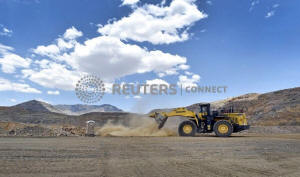Exclusive: Pentagon to stockpile rare earth magnets for missiles,
fighter jets
 Send a link to a friend
Send a link to a friend
 [December 20, 2019]
By Ernest Scheyder [December 20, 2019]
By Ernest Scheyder
(Reuters) - The U.S. military plans to
stockpile rare earth magnets used in Javelin missiles and F-35 fighter
jets, according to a government document seen by Reuters, a step that
critics say does little to help create a domestic industry to build
specialized magnets now made almost exclusively in Asia.
The Pentagon is seeking proposals to cache a rotating six-month supply
of neodymium iron boron (NdFeB) magnets, a type of rare earth magnet
essential to weapons manufacturing, according to the document, detailing
the latest attempt to weaken China's control over the rare earths
sector.
Beijing has been using that prowess for leverage in its trade war with
Washington.
The request effectively seeks someone to warehouse a six-month supply of
the specialized magnets and maintain it for at least 30 months. It does
not offer financial support for NdFeB magnet manufacturing, which
industry analysts and executives say is a short-sighted misstep by the
Pentagon.

"This is definitely a curve ball," said Peter Afiuny of Urban Mining Co,
a privately held company building a rare earth magnet facility near
Austin, Texas. "We expected the call would be strategically aimed at
actually doing something to spur domestic production capacity."
China and Japan are the world's largest NdFeB magnet producers. None of
the specialized magnets are made in the United States, though a U.S.
Naval Research Laboratory scientist invented them in the early 1980s.
Reuters reported last week that the Pentagon is funding construction of
rare earths processing facilities. But after rare earths are processed,
they must be turned into magnets, otherwise they are of little value to
electronics and weapons manufacturers.
The Pentagon did not respond to requests for comment.
President Donald Trump this year ordered the military to update its
supply chain for the niche materials, warning that reliance on other
nations could hamper U.S. defenses.
Responses to this latest Pentagon request are due by Jan. 22, 2020,
according to the document.
The Pentagon plans to spend $10 million on the program, with recipients
funding another $10 million in total. Each recipient will receive a
maximum of $3 million, according to the document.
It was not immediately clear why the Pentagon only wants an available
supply for 30 months nor was it clear the volume or grade of magnet
being sought or the timeline of when winners could be picked.
[to top of second column]
|

A front-end loader is used to reinforce a safety berm inside the
open pit at a rare earth facility in California June 29, 2015.
REUTERS/David Becker/File Photo

"Our government usually moves slowly unless there's a severe crisis,
at which time extraordinary action is needed to mitigate the
problem," said Steve Constantinides, a U.S.-based rare earths
industry consultant.
Because Hitachi Metals Ltd <5486.T> controls the processing patent
for NdFeB magnets, the request is likely to be a boon for the
Japanese company. Urban Mining, the Texas startup, says its NdFeB
manufacturing process involves recycling of older magnets.
Hitachi licenses its technology to manufacturers in China and
elsewhere, but none in the United States. Chinese producers remain
by far the world's cheapest producers of magnets.
Hitachi Metals did not respond to a request for comment.
The Pentagon's request acknowledges that if no domestic rare earth
sources are available to build the stockpile, foreign suppliers may
be used. But the U.S. Congress this year approved legislation that
forbids the Pentagon from using magnets made in China, North Korea
or Russia, further complicating the supply chain.
Hitachi Metals itself expanded an NdFeB magnet plant in China Grove,
North Carolina, in 2011 before shuttering the NdFeB magnet
operations around 2015 due to challenging economics. The equipment
is being auctioned off now.
That, critics say, points to the need for direct U.S. government
involvement.
"Government support is an insurance policy for domestic
manufacturing," said Ed Richardson of the U.S. Magnetic Materials
Association, an industry trade group.
Richardson estimates the Pentagon would need to spend about $50
million to build a U.S. rare earth magnet facility. "It's a small
amount of money to pay so if we go to war with China, we're not
calling them up asking for supply" of rare earth magnets.

(Reporting by Ernest Scheyder; Additional reporting by Yuka Obayashi
in Tokyo; Editing by Amran Abocar and David Gregorio)
[© 2019 Thomson Reuters. All rights
reserved.]
Copyright 2019 Reuters. All rights reserved. This material may not be published,
broadcast, rewritten or redistributed.
Thompson Reuters is solely responsible for this content. |